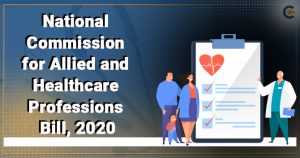The National Commission for Allied and Healthcare Professions Bill, 2020:

The National Commission for Allied and Healthcare Professions Bill, 2020 was passed unanimously by the Lok Sabha.
- The Bill seeks to regulate and standardize the education and practice of allied and healthcare professionals.
- The group of allied professionals is large and the Bill is trying to regulate this field by providing dignity to their roles.
National Commission for Allied and Healthcare Professions:
- The Bill sets up the National Commission for Allied and Healthcare Professions.
- It will consist of a Chairperson, Vice-Chairperson, five members representing various Departments/Ministries of the central government, one representative from the Directorate General of Health Services, three Deputy Directors or Medical Superintendents appointed on a rotational basis from amongst medical institutions and 12 part-time members representing State Councils, among others.
- The Commission will perform the following functions with regard to Allied and Healthcare Professionals:
- Creating and maintaining an online Central Register of all registered professionals.
- Providing basic standards of education, courses, curriculum, staff qualifications, examination, training, maximum fee payable for various categories.
Professional Councils:
- The Commission will constitute a Professional Council for every recognised category of allied and healthcare professions.
- The Professional Council will consist of a president and four to 24 members, representing each profession in the recognised category.
- The Commission may delegate any of its functions to this Council.
State Councils:
- Within six months from the passage of the Bill, state governments will constitute State Allied and Healthcare Councils.
- It will complement the functioning of the National Commission and maintain a State Register.
Permission for Establishment of Institutions:
- Prior permission of the State Council will be required to: Establish a new institution.
- Open new courses, increase the admission capacity, or admit a new batch of students to existing institutions.
- If such permission is not sought, then any qualification granted to a student from such an institution will not be recognised under the Bill.
Offences and Penalties:
- No person is allowed to practice as a qualified allied and healthcare practitioner other than those enrolled in a State Register or the National Register.
- Any person who contravenes this provision will be punished with a fine of Rs. 50,000.




